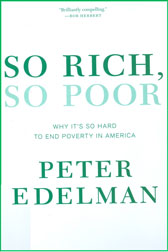
The Poverty of Anti-Poverty Policy
So Rich, So Poor: Why It‘s So Hard to End Poverty in America, by Peter Edelman. The New Press, 2012.
This article is from Dollars & Sense: Real World Economics, available at http://www.dollarsandsense.org

This article is from the January/February 2013 issue of Dollars & Sense magazine.
Subscribe Now
at a 30% discount.
I have long admired Peter Edelman. He served as an aide to Sen. Robert Kennedy while Kennedy was developing an anti-poverty agenda for the United States. During the Clinton administration, Edelman was an assistant secretary in the Department of Health and Human Services. His superb 2006 book, Reconnecting Disadvantaged Young Men (written with Harry Holzer and Paul Offner), advocated several policies to increase earnings for less-educated and less-skilled young men.
In an act of enormous political courage, Edelman resigned in protest when President Clinton signed the bill ending the main U.S. welfare program, Aid to Families with Dependent Children (AFDC), and replacing it with Temporary Assistance to Needy Families (TANF). He then went public in The Atlantic Monthly, explaining the many negative effects of “ending welfare as we know it.”
So Rich, So Poor explains why poverty is so high in the United States and what we can do about it. Extremely well- written and passionate, it is part history of the war on poverty, part explanation of why the U.S. poverty rate is so high, and part policy advocacy. It exudes enormous optimism—a welcome antidote to the usual cynicism about ending poverty and blaming the victims.
As one would expect, this book is strongest on those subjects Edelman knows best. It is excellent on Bobby Kennedy, the creation of community development corporations (CDCs) as an answer to inner-city poverty, and how CDCs influenced efforts such as Empowerment Zones in the 1990s (a main subject of Edelman's excellent 1993 book Searching for America's Heart: RFK and the Renewal of Hope).
It is also very good on the history of U.S. welfare programs and on why poverty has been on the rise in recent decades. Edelman identifies several reasons why poverty, after falling for several decades, began to increase in the 1970s. Declining unionization, free-trade agreements, and immigration have all lowered real wages for people on the lowest rungs of the economic ladder. A lower real minimum wage made it more difficult to work one’s way out of poverty. More households headed by single women make it harder for families to escape poverty because there is only one wage earner, and because women's wages are, on average, lower than men's. Dismantling welfare made life harder for those who cannot easily work their way out of poverty. And more recently, the Obama stimulus package focused too much on tax cuts. It also failed to directly create jobs, as the CCC and WPA had during the Great Depression.
Edelman's solutions are similarly multi-faceted. We need jobs that pay decent wages. We must repair the social safety net. Some of his favorite programs and policies are federally funded child care, Head Start, affordable housing for low-income families, drug legalization, and prison reform. Finally, he wants both to make college affordable and to develop vocational education programs so those not going to college will have a career path. To finance all this, Edelman proposes repealing the Bush tax cuts for the very wealthy.
Despite its many strengths, this book suffers from insufficient detail in many places. For example, it doesn't clearly explain why the various official U.S. poverty lines are too low. Edelman also fails to specify at what income level the Bush tax cuts should be repealed or address whether this will yield enough revenue to finance the programs he endorses.
This lack of detail is particularly acute when the book turns to anti-poverty policy. Many policies are mentioned, but there is little effort to demonstrate that these policies have been successful where and when they have been tried. Additional discussion, and some priorities among the many programs mentioned, would have made this a stronger book.
For me, children need to come first; and my top policy priority would be something Edelman fails to mention. In the 1940s, economist Gunnar Myrdal proposed a generous paid parental leave program for Sweden. His goal was to provide financial support to women during and immediately after childbirth. After this program was enacted, child poverty in Sweden fell sharply. Other countries soon followed Sweden’s lead, with similar results. Today, the United States is one of only four countries in the world without paid parental leave. It should not be this way in a nation that is so rich.
Did you find this article useful? Please consider supporting our work by donating or subscribing.
